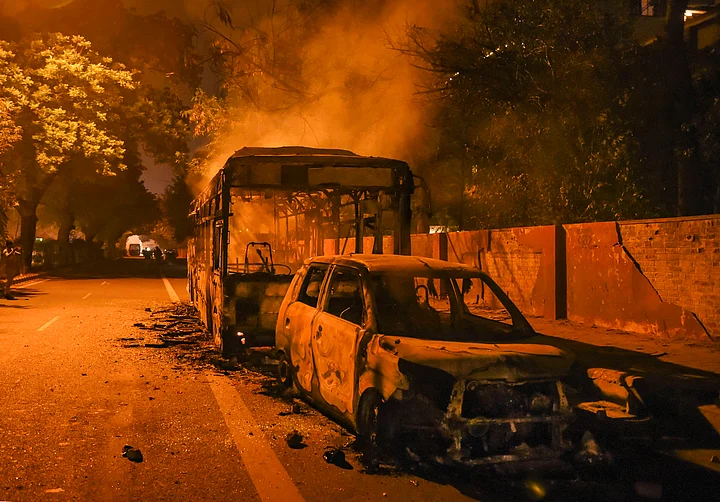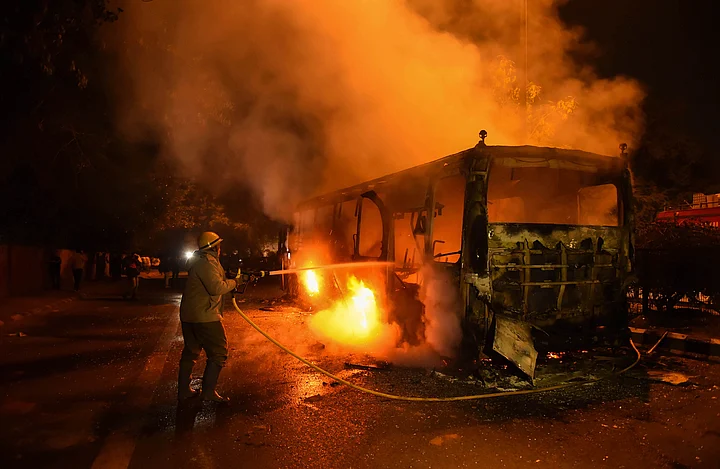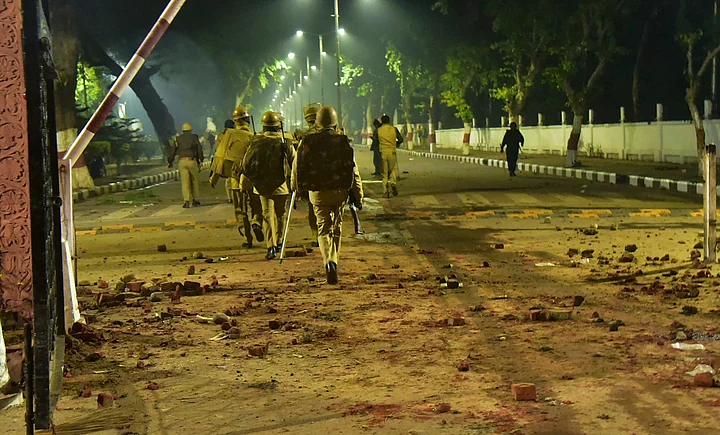Video Editor: Ashutosh Bhardwaj
(This story was first published on 29 December 2019 and is being republished from The Quint's archives to mark two years of the attack on Jamia Millia Islamia University campus by the Delhi Police.)
“Faraz”? “Faraz”?
“Is anyone inside the library? Don’t feel scared, we have come to take you back home.”
The Jamia Millia Islamia University gates were finally opened after hours of being locked around 9 pm on Sunday, 15 December, but where were its students – those we saw, in a WhatsApp video, hiding in a vandalised library while the police fired tear gas shells and broke glasses? Where were those students who kept dialling different numbers appealing for help?
Southeast Delhi had turned into a virtual war zone on Sunday after a protest against the Citizenship (Amendment) Act turned violent.
Buses were torched, policemen and students were injured in a protest that the students claimed started off peacefully but were ransacked by “outsiders” and “unreasonable, unjustifiable” police action.
While many shared a video claiming a cop poured “fuel” on a bus to set it ablaze, the police denied the charge saying they were pouring “water and not petrol.”
‘Where Are Our Children?’
Frantic calls went unanswered as parents, teachers and ex-students searched from pillar to post in the campus for their own.
“We can see bloodstains all around the campus but can’t find our children. Where did they all go?” a mother peeped inside the broken doors of the library room.
“Maybe they are hiding inside the ditches, we should check,” a professor in the university was finally able to enter the campus in search of the students who had made panic calls asking him to save them.
‘Fall in Line’
DCP South East Chinmay Biswal, who led the charge on Sunday, had just finished his interviews with media channels.
“We retaliated only to stop violent mobs,” he answered when asked about why policemen had resorted to lathicharge, batons and shelling tear gas inside the Jamia campus.
“Fall in line,” Biswal’s senior, who had just arrived at the spot, announced through the loudspeaker, the one that the police was previously using to ask protesters to retract.
Minutes before the announcement, a group of policemen stood guard opposite the main gate of the university to shoot tear gas at a group of protesters who were approaching from the other end of the lane. “We will have to shoot if you take a step ahead,” a policeman announced signalling with his hands at the protesters to move back as the latter waited with stones in their hands.
After prolonged confrontation, the protesters dispersed. “Ab aur kuch nehi hoga, khatam ho gaya bass (Nothing more will happen, it is over now),” another policeman told his junior.
In the next 30 minutes, there was no policeman to be seen in and around the campus.
Hungry & Afraid
Still looking for the missing students, we reached the lane behind the campus where a group of students sat around a bonfire after a cold night of fight and resilience.
While the locals from the area in that group recalled how they rescued the students by breaking the boundary wall, some more students from the campus crossed over the broken wall to join the discussion.
A second year student said, “When the police entered the Jamia campus, the students switched off the lights of the library and were hiding there. The police kept shelling tear gas and then entered the room and beat them up.”
Taking a sip of tea after “hours of siege”, he further said, “Some of the students have gone back to the hostels and those who were injured have been taken to the hospital.”
Afraid of being named, he added, “Actually, the students in the hostels have switched off the lights and staying put for the night. There was some WhatsApp forward that the police will raid the hostels at night.”
“Most of us have not eaten anything, we are starving. Let’s see if we can find some Maggi at least.” A local who was part of the group called out to a nearby shopkeeper, “Bhaiyya, Maggi mil jayega abhi? Bachhe bhukhe hai.” (Brother, can we get Maggi? The students are hungry here.”
As we tried to find our way into the campus, a student rushed out of the gate with a suitcase. “My brother has come to pick me up, I don’t want to stay here. Feel very unsafe.” As he drags his suitcase out of the gate, a relieved brother waited on the other end. “I couldn’t contact him for really long. It was very scary.”
‘Police Vandalised Place of Worship, Broke Our Canteen’
Bloodstains, broken glasses and torn slippers greeted us in the mosque inside the Jamia campus, which was allegedly vandalised by the police.
The police, in their official version, have insisted that there were “outsiders” who were taking shelter inside the campus, which is why they had to enter and take action, an argument the students negated. “We want to know who these miscreants were? And why were police beating innocent students if they didn’t have any proof of them creating nuisance at the protest earlier?”
“The police did not even listen to the repeated appeals of the Imam who said that he will ensure the students who are hiding in the mosque will not cause any violence. The police did not care. They went inside and vandalised our place of worship,” a third year student of the university said.
Detained Students Freed at Midnight
As the protests spilled over to the other campuses across the country including Aligarh Muslim University, where there was another case of student-police clash, Jamia students were taken to different police stations. Human rights activist Harsh Mander, who met the students detained at Kalkaji police station, said, “They were picked from the library and brought here. Many of them are badly injured.”
Of the nearly 50 students, 35 were released from the Kalkaji police station and 15 from the New Friends Colony police station late into the night.
‘Azadi’ Chants Reverberate at Delhi Police HQ
Meanwhile, calls of “Azadi” and “We want justice” reverberated in another part of the national capital.
Hundreds of students thronged the Delhi Police headquarters at ITO late on Sunday night to take part in an "emergency" protest against the police action at Jamia Millia Islamia.
(With inputs from Vakasha at Kalkaji Police Station and Aishwarya Iyer at Delhi Police Headquarters.)



